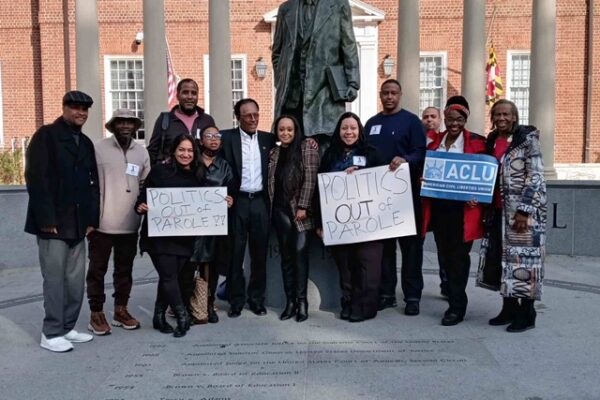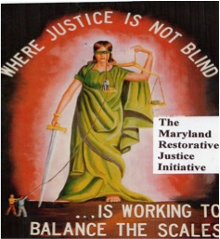Victory Advances Maryland on the Road to Fixing Broken Parole System for People Who Have Earned Release and Deserve a Second Chance
BALTIMORE, MD – In an important victory on the road to fixing the state’s broken parole process for Marylanders given life sentences, today the Maryland Board of Public Works (BPW) approved a legal settlement that requires the Maryland Parole Commission (MPC), Division of Correction (DOC), and Governor to adopt new regulations and policies to help rebuild Maryland’s parole process for those sentenced as children to life imprisonment.
Since 1995, when Maryland adopted its “life means life” policy, parole in Maryland has operated as a system of clemency that denied Marylanders sentenced to life with parole as children any meaningful or realistic hope of release. The settlement requires all the decision-makers to give mitigating weight to the age of children who are sentenced, provide much greater transparency about their decisions and their reasoning, and work more closely together to identify and advance those sentenced to life as children toward release. By doing so, the settlement seeks to eliminate the arbitrary barriers that have prevented Marylanders given life sentences as children from being paroled, notwithstanding their demonstrated maturity and rehabilitation.
The lawsuit was brought by three Marylanders sentenced while children to life with parole – Nathaniel Foster, Calvin McNeill, and Kenneth Tucker – and the Maryland Restorative Justice Initiative, an organization that works for the rights of people who are incarcerated. When the case was filed in 2016, Maryland had functionally abolished parole for lifers in violation of the constitutional rights of those sentenced as children. No Marylander serving a life with parole sentence had been granted parole in more than two decades, including Marylanders sentenced when they were children. Everything about the parole process had adapted to the reality that parole was essentially unattainable for anyone sentenced to life. In 2020, both Mr. Foster and Mr. McNeill were released – Mr. Foster because his sentence was commuted and Mr. McNeill through a judge’s resentencing order. Mr. Tucker hopes to achieve release soon.
Calvin McNeill said: "I spent 39 years incarcerated for something I did at 16 years old. Me and others were sentenced to life in prison, but it was with the possibility of parole. When the governor made that statement, ‘life means life,’ he took away all hope and possibility from everyone inside those walls.”
Kenneth Tucker said: “With the settlement, we are no longer held hostage. But more importantly, brothers are now excited about fighting for their liberty. The case has established a movement behind the wall, a fever that cannot be contained.”
Nathaniel Foster said: “The settlement is great for a lot of guys, not just people sentenced as juveniles alone. We’re the face of the lawsuit, but this is going to trickle down and help everybody. There a lot of guys who are waiting to be released, and the reason you don’t know about them is because they are doing everything right. They just need a chance to do the right thing and be released.”
Maryland’s broken parole system, which gives the Governor unfettered control over whether to accept the Maryland Parole Commission’s recommendation to release someone who has earned it, wrongfully politicizes the process. The ACLU strongly supports legislation in the General Assembly to fix that and return the decision to the MPC. Through that long-standing policy, Maryland converted "life with parole" sentences into de facto "life without parole" sentences that constitute cruel and unusual punishment for Marylanders sentenced as children under Supreme Court precedent.
Walter Lomax, Director of the Maryland Restorative Justice Initiative, said: “The lawsuit has caused officials to look a little more critically and carefully how that individual was, first at what that individual’s circumstances were at the time and second, how they progressed since they have been in the system, and how they have matured and developed over time, when they are making their decision about whether they should be released.”
The lawsuit took on more than just the Governor’s role; it also challenged the numerous practices of the Maryland Parole Commission and Division of Correction that further established an arbitrary, secret system of clemency. When the lawsuit was filed in 2016, no Marylander who had been given a life sentence as a child had been granted parole in over twenty years. The MPC had ceased even making recommendations for parole, using clemency instead, which shrouded the process in secrecy and did not provide a meaningful chance to earn parole, contrary to the constitutional rights of people who were children when they were sentenced. MPC frequently withheld from parole candidates and their representatives records that were being used in decision-making. No effort was made to consider youth as a mitigating factor and no record was made of parole hearings. MPC rarely provided any rationale for its decision.
In addition, the MPC used deeply flawed risk assessments that gave no consideration to how parole candidates had worked to demonstrate their rehabilitation behind the walls and falsely identified nearly all those sentenced as children as being high risk of recidivating. The DOC treated all those with life with parole sentences as if they would die behind the walls, not even going through the motions of taking the steps necessary to give people a chance to demonstrate that they could meet the criteria for parole. No one knew what the Governor considered in making parole decisions, and the Governor was not required to provide any explanation for the decisions.
As a result of the lawsuit, the system of parole consideration for Marylanders sentenced as children must consider their youth and their demonstrated maturity and rehabilitation over time, must not impose arbitrary barriers to release, and must be much more transparent about the process and decision-making. In addition, the settlement is intended to encourage the DOC to better help prepare those sentenced as children for return to the community.
Sonia Kumar, Senior Staff Attorney for the ACLU of Maryland, said: “Today’s settlement is a victory for those sentenced as children and their families, who have fought for recognition of their humanity for decades. And even though we still have a long way to go in building a functioning parole system for people serving life sentences, this settlement brings us one step closer to ending the system of mass incarceration that has targeted Black communities.”
Maryland has some of the worst racial disparities in the nation with respect to people serving life sentences, tying the state with places like Louisiana and Mississippi; about 84 percent of those serving life sentences for offenses committed as children are Black, even though Maryland’s population is only about 30 percent Black.
Mary Borja, Partner with Wiley, said: “We are pleased with the hard-fought settlement result in this important case. Our criminal justice system should provide a real opportunity for individuals – who may have made mistakes at a young age or were not treated equitably within the system – to rehabilitate themselves as they mature into adulthood. We are pleased that of the three individuals who filed the lawsuit, both Nathaniel and Calvin have been released, and we hope that Kenny will be released soon.”
The plaintiffs are represented by Mary Borja, Richard A. Simpson, Gary Ward, George Petel and Ashley Criss of Wiley; Barry Fleishman of Pillsbury, as well as ACLU of Maryland Senior Staff Attorney Sonia Kumar and Legal Director Deborah Jeon with support from Gina Elleby and Dara Johnson.
###
Related Content

“Juvenile Lifers” Challenge Constitutionality of Statute Granting Governor Boundless Discretion to Decide Their Fate In Parole

Great Day for Fairness as Veto Overridden on Bill to Take Governor Out of Parole After Decade-Long Battle
Stay Informed
Sign up to be the first to hear about how to take action.
By completing this form, I agree to receive occasional emails per the terms of the ACLU’s privacy statement.
By completing this form, I agree to receive occasional emails per the terms of the ACLU’s privacy statement.

